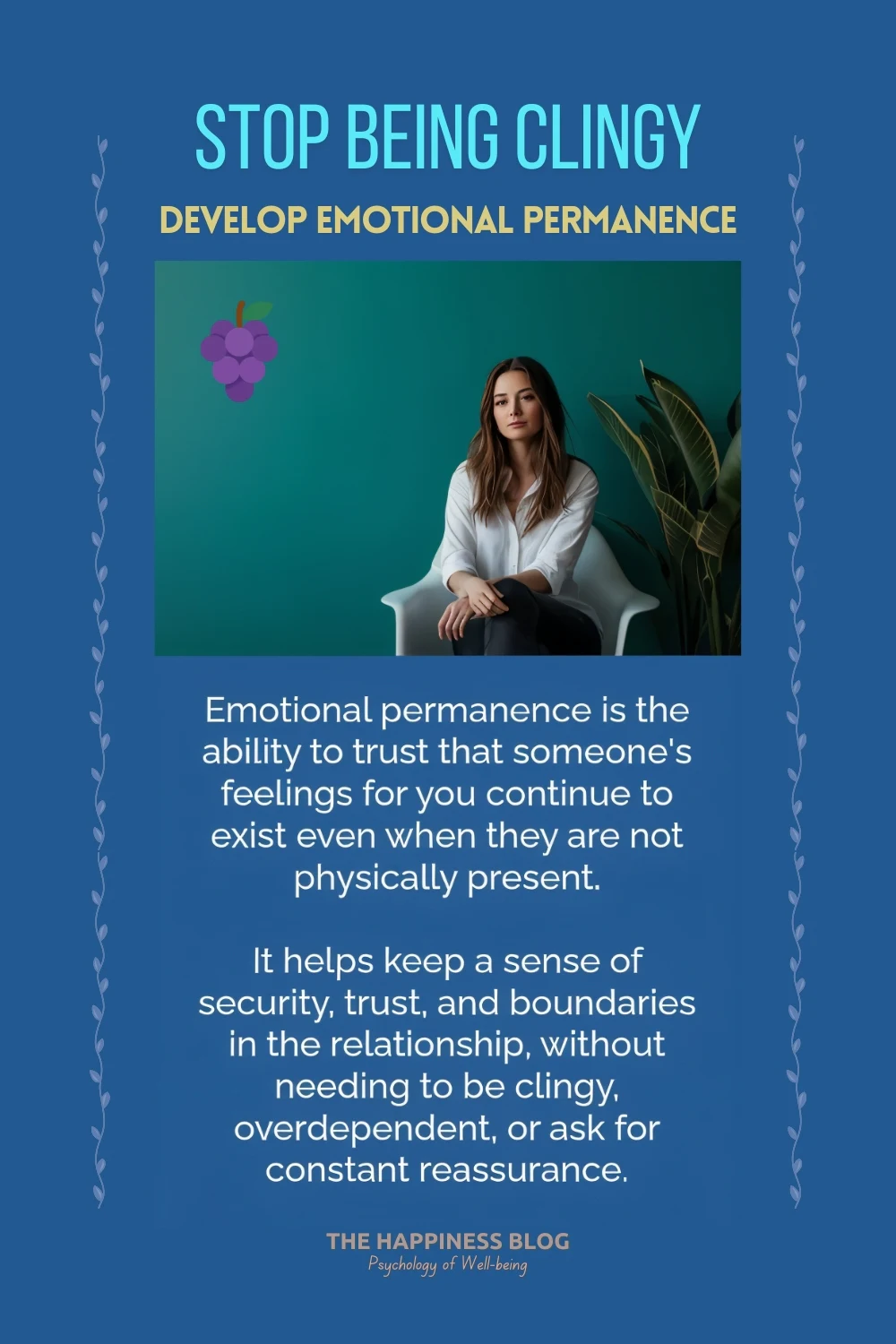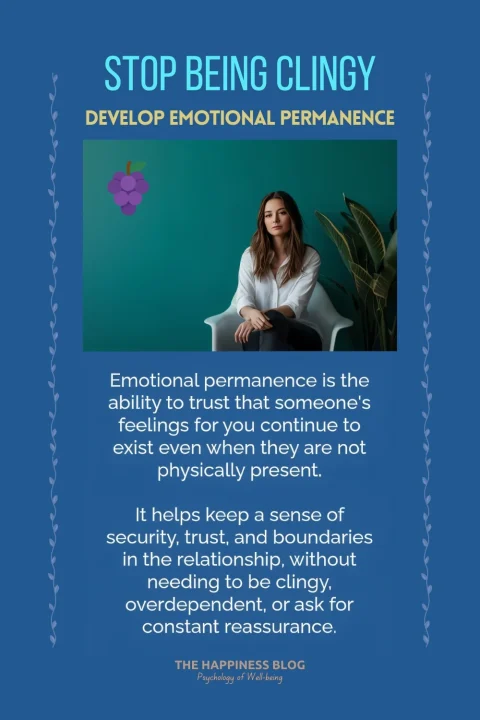Today's Saturday • 7 mins read
Clingy people live a single insecurity: they are just one step from being left, neglected and unloved.
They demand constant attention, physical closeness, and emotional reassurance. They’re always asking, “Is he going to leave me?” or “Has she started to hate me?”
If they aren’t told they’re loved again and again, they assume the love has vanished. They might ask:
“Promise you’ll never leave me.”
“Tell me you love me five times today.”
This signals an anxious attachment style: intense worry and fixation on close relationships. Paradoxically, their repeated checking, jealousy, and panic can annoy and push partners away.
The solution is developing emotional permanence.
What Is Emotional Permanence?
Emotional permanence is the ability to trust that someone’s feelings for you continue to exist even when they are not physically present. It allows you to feel loved and valued without needing constant reassurance.
It helps to maintain a sense of security, trust, and boundaries in close relationships without requiring constant physical presence or validation.

Roots of Clinginess
Clinginess is often rooted in past experiences of abandonment, leaving people unsure whether others will reliably meet their need for closeness and driving them to seek constant reassurance.
They may have a history of:
- Parental Absence: Physical or emotional neglect or inconsistent caregiving during childhood.
- Low Self-Esteem: Feeling fundamentally unlovable due to earlier abuse.
- Relational Trauma: Past hurts like being ghosted.

How To Stop Being Clingy And Build Emotional Permanence
Letting go of the need to cling to your partner and building emotional permanence requires retraining your brain to handle periods of separation.
1. Challenge Negative Thoughts
Clinginess is driven by negative, distorted thoughts like “I’m not good enough,” “They don’t care,” “They’ll leave me.”
Practice cognitive restructuring:
- Notice the thought
- Then challenge the thought
- Write down what your partner actually says or does
- Replace it with a more realistic, accurate, and self‑affirming alternative
For example, instead of “He didn’t text me back; he must not care,” try “He’s probably busy; I’ll hear from him when he can.”
Occasional reassurance from your partner is okay, but don’t turn it into a constant need. When you have fears about abandonment, try these simple reminders:
- “My thoughts aren’t always telling the truth.”
- “I may not be perfect, but I’m not unlovable.”
- “She needs space, and is not abandoning me.”
Reframing negative thoughts reduces their emotional power and helps you respond more calmly. Two practical steps:
- Keep a brief note of reassuring things your partner says or does, and read it when you feel insecure.
- When a worry arises, pause and ask: What evidence supports this? What evidence contradicts it? Then update the thought.
Regular practice or will build emotional permanence and a stronger sense of self.
2. Practice Self-Soothing
Clinginess is mounted on wobbly rocks of anxiety, stress, and uncertainty.
Try one of these self-soothing strategies:
- Calming activities: Belly breathing, listening to soft music, reading an easy book, or indulging in a soothing hobby.
- Mindfulness: observe your feelings of neediness, notice the times they get triggered, and let them pass unjudged without acting on them.
- Socializing: reach out to supportive people other than your partner, share with them your neediness for constant assurance of love, and discuss some balanced ways to respond.
- Visualization: Visualize love as a constant, invisible thread connecting you and your partner, not something that needs to be proven or shown every moment.
Build your own repertoire of self-soothing techniques that work best to calm your turbulent emotions about abandonment.
It may seem difficult at first to reduce your reliance on your partner for emotional validation. Instead of immediately seeking reassurance from your partner, self-soothe yourself.
3. Reinforce Self-Worth
Self-worth is how much you value yourself. A strong sense of self-worth reduces the need for external validation and helps develop emotional permanence.
Affirm yourself that you are whole on your own. Your partner’s love adds to your life’s joy and purpose, not solely define you.
Every time you need to ask them if they love you, sit with those feelings, and speak kindly to yourself:
- “I can be secure in love without constant reassurance.”
- “Even if I don’t hear it right now, I am loved and valued.”
- “I am capable of giving myself the love I seek from others.”
- “I trust in the love she has for me — it’s there, even in silence.”
- “My worth is not determined by how much attention I receive.”
- “My partner’s love is steady, even when not expressed every moment.”
- “I am whole on my own; my partner’s love adds to my joy, not defines it.”
To have a healthy sense of self-worth and feel more confident in your own skin, try:
- Practice self-compassion. Treat yourself as you would treat your best friend.
- Practice gratitude. Feel thankful for the good things and people you have in your life.
- Practice self-love. List your appreciable qualities, good habits, and remarkable achievements.
4. Practice Degrees of Separation
Start with brief periods of time apart to build your tolerance. Gradually increase the distance to realize that the relationship remains secure even when you are not physically together.
If you’re used to spending most of your time with your partner, start practicing brief periods of separation.
- Try spending an evening apart, doing separate hobbies, or going on individual outings with friends.
- Gradually increase the time and distance apart to build your tolerance for separation.
- Be open and honest about how you are coping, and discus how you can get better.
Over time, it would make you realize that your relationship remains secure even when you’re not physically together.
5. Communicate Intentionally
Excessive communication can actually push a partner away. Discuss your goals with your partner, and practice “silent togetherness” to normalize periods of quiet.
Excessive communication is one of the signs and causes of clinginess. You may need to cut it down a bit.
Discuss this with your partner first, or they may feel oddly left out.
Tell them, and show them, that from now on, you will avoid constant reassurance-seeking. And bring in more moments of silence or silent togetherness in your relationship.
- Write down your needs, urges, and concerns that you want to talk to your partner. Share it with him at a later time.
- Practice silence, talking to your partner only when it gets too uncomfortable, but only in a calm and respectful manner.
- Have weekly sessions of doing things in the same room without talking to each other, followed by how you felt during those moments.

Benefits of Healthy Emotional Permanence
- Relationship Stability: You can handle a partner’s absence, communicate effectively and resolve disputes in a healthy way.
- Emotional Stability: You can see emotions as temporary, and less likely to become overly invested in intense emotions.
- Resilience: You can recall your past successes and gain the strength to handle life’s challenges and bounce back.
- Better Mental Health: Regulating your emotions reduces symptoms of depression and anxiety.
Signs That You Don’t Have Emotional Permanence
- Seek constant validation and reassurance.
- Get caught in extreme emotional turmoils.
- Have difficulty regulating your moods and emotions.
- Can’t recall happier times when you sad or not feeling good.
- Can’t understand the simultaneous existence of two opposing emotions.
Overall, you may have problems maintaining stable relationships.
If you find it difficult to manage it alone, seek help from a mental health clinician for a personalized recovery plan and healthier relationship patterns.
Emotional Impermanence & Neurodivergence
A lack of emotional permanence is often called emotional impermanence or a permanence deficit. This is common in individuals with ADHD, Borderline Personality Disorder (BPD), or Bipolar Disorder.
Those with a deficit struggle to understand an emotion unless they are actively feeling it. If they are sad, they cannot remember what it feels like to be happy.
Did you know about the dark side of ADHD?
Final Words
Emotional impermanence is a powerful antidote to clinginess, excessive dependency, fear of abandonment, and fearful-avoidant attachment.
Insecurity can create false beliefs like “I am unlovable.” Don’t let that stop you from reaching out and investing in relationships.
Remember: thoughts and emotions aren’t always true, and feelings are temporary. And it’s okay to seek a psychologist’s support—reach out when life feels hard.
√ Also Read: ADHD Emotional Permanence: Why Out-of-Sight Is Out-of-Mind?
√ Please share this with someone.
» You deserve happiness! Choosing therapy could be your best decision.
...
• Disclosure: Buying via our links earns us a small commission.
